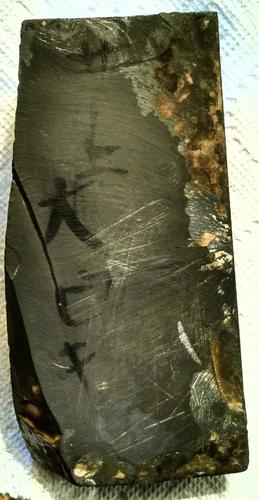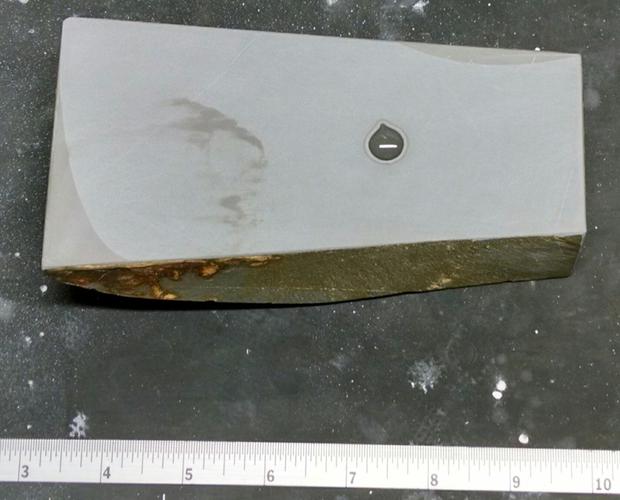Results 1 to 10 of 18
Thread: Anyone read Japanese kanji?
-
10-17-2014, 04:35 PM #1Senior Member

- Join Date
- Sep 2013
- Location
- NW Indiana
- Posts
- 1,060
Thanked: 246 Anyone read Japanese kanji?
Anyone read Japanese kanji?
Picked up a JNat recently and not sure what it is, it has some faded writing on the bottom in Japanese, not sure if there's enough there for someone to read it or not though. It's pretty hard and very fine. It supposedly came from a Japanese barber shop and was used to sharpen razors and scissors according to the person I got it from.

-
10-19-2014, 09:00 AM #2Senior Member

- Join Date
- Oct 2014
- Location
- Sunderland
- Posts
- 189
Thanked: 26
It says "Please turn over"

I know there are sites that translate kanji. If i can remember where i found it i could drop that picture in or get back to you with a link.
-
10-19-2014, 09:40 AM #3Senior Member

- Join Date
- Sep 2013
- Location
- NW Indiana
- Posts
- 1,060
Thanked: 246
Lol, that'd be hilarious - watch it end up saying "If you're using this side, you're doing it wrong!"

But seriously, if you know of something that can translate it that would be great. I tried a site that you use your mouse to write the kanji and I think I found some, but they don't make any sense to me.
Here's a shot of the other side, I was doing the water drop test to see how long the water would stay on the surface without soaking in. (I quit timing after an hour and a half).

-
10-19-2014, 12:07 PM #4Senior Member

- Join Date
- Oct 2014
- Location
- Sunderland
- Posts
- 189
Thanked: 26
I just joined a group on facebook named omniglot (pending). I will post the picture there and see if anyone can help.
-
10-19-2014, 12:34 PM #5Senior Member

- Join Date
- Sep 2009
- Location
- Mouzon, France
- Posts
- 507
Thanked: 116
"The world big" then "biki"... my wife says it makes no sense

-
10-19-2014, 01:23 PM #6I used Nakayamas for my house



- Join Date
- Aug 2009
- Location
- Des Moines
- Posts
- 8,664
- Blog Entries
- 1
Thanked: 2591
very nice uniform color on the stone, that usually is a good sign.
Last edited by mainaman; 10-19-2014 at 07:47 PM.
Stefan
-
10-19-2014, 03:36 PM #7Senior Member

- Join Date
- Sep 2013
- Location
- NW Indiana
- Posts
- 1,060
Thanked: 246
That's be awesome Stev, thanks.
I looked up what I could and as far as I could tell, the following kanji either matched or were as close as I could find. The site gave the following meanings for the ones I thought matched the best:
1st: 20?
2nd: above, up
3rd: large, big
4th: ?
5th: dry, parch, ebb, recede, interfere
The stone itself seems to be outstanding - very uniform, it almost looks (top surface only, of course) like a synth it's so uniform. It is also very very smooth, no rogue scratches at all. I really like this stone. Finish on fresh light slurry is a barely hazy mirror, and once the slurry breaks down it's pretty much bright mirror.Last edited by eKretz; 10-19-2014 at 03:39 PM.
-
10-19-2014, 04:15 PM #8Senior Member

- Join Date
- Sep 2009
- Location
- Mouzon, France
- Posts
- 507
Thanked: 116
The first two kanji together translates at "the world", the first one was hard to read as more than half of it is barely there (世). If there was another kanji in front, the current first could be the suffix for "geological era".
-
10-19-2014, 04:22 PM #9Senior Member

- Join Date
- Sep 2013
- Location
- NW Indiana
- Posts
- 1,060
Thanked: 246
Interesting, but I'm not sure why someone would take the time to write that on a stone. Maybe we are missing enough so as to make it unintelligible? If your wife is a native Japanese speaker and that's what she says it says (The world big, and what is biki?), I'm guessing we are missing something, as that would make no sense at all to write on a stone to me.
-
10-19-2014, 05:24 PM #10Senior Member

- Join Date
- Sep 2009
- Location
- Mouzon, France
- Posts
- 507
Thanked: 116
Yes, she is Japanese. To make it even more confusing, the "biki" part is written in katakana... used nowadays for words of foreign origin (it could be biki or viki). There is also the possibility that the whole inscription is specialized vocabulary, but I didn't find any match in the online scientific dictionaries. There's also another possibility: the fourth character could be a kanji she never encountered before instead of a katakana.


 4Likes
4Likes LinkBack URL
LinkBack URL About LinkBacks
About LinkBacks






 Reply With Quote
Reply With Quote